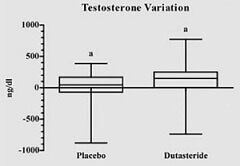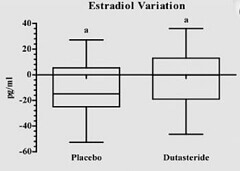In 2015, I wrote a popular post on how finasteride impacts testosterone and estrogen levels. This time, I want to examine how the stronger DHT inhibitor dutasteride effects testosterone and estrogen levels.
Propecia (brand name finasteride) increased mean circulating levels of both testosterone and estradiol (estrogen) by approximately 15% per one study by its manufacturer Merck. See page 8 in here under the section on pharmacodynamics for more details. However, this increase is not substantial enough to cause testosterone and estrogen levels to exceed the reference range. In the same study, finasteride (1 mg) rapidly reduced serum DHT by 65% within 24 hours of ingestion.
Dutasteride, Testosterone and Estrogen
Dihydrotestosterone (DHT) blockers reduce the conversion of testosterone to dihydrotestosterone. This results in higher levels of circulating free testosterone (aka the male sex hormone).
When first researching this subject a few years ago, I expected that dutasteride would cause significantly greater increases in testosterone and estrogen levels in comparison to the weaker finasteride. Dutasteride inhibits DHT levels to a far greater extent than finasteride. Moreover, it inhibits both type 1 and type 2, 5α-reductase isoenzymes which are responsible for the conversion of testosterone to DHT.
See my post on dutasteride being more effective than finasteride when it comes to hair growth. Note that the former also causes higher rates of side effects in comparison to the latter. I take dutasteride (0.5 mg once every 3 days), and feel like it might have given me some weight gain and gynecomastia.
However, the one time I measured my estrogen (female sex hormone) level, it was within the normal range for a male. I also have a far more sedentary life than when I used to be extremely skinny (although my caloric intake has not changed). On a side note, estrogen can lead to increased hair growth.
Dutasteride and Testosterone
According to the package insert from GSK (the manufacturer of the original Avodart brand):
“In BPH patients treated with 0.5 mg of dutasteride daily the median decrease in DHT was 94% at 1 year and 93% at 2 years. The median increase in serum testosterone was 19% at both 1 and 2 years. This is an expected consequence of 5α-reductase inhibition and did not result in any known adverse events.”
According to the Avodart monograph from GSK, a 52 week treatment with dutasteride 0.5 mg/day resulted in:
“No clinically significant change compared with placebo in sex hormone binding globulin, estradiol, luteinizing hormone, follicle-stimulating hormone, thyroxine (free T4), and dehydroepiandrosterone. Statistically significant mean increases compared with placebo were observed for total testosterone at 8 weeks and thyroid-stimulating hormone (TSH) at 52 weeks. The median percentage changes from baseline within the dutasteride group were 17.9% for testosterone at 8 weeks and 12.4% for TSH at 52 weeks.”

The good news is that after stopping dutasteride for 24 weeks, the mean levels of testosterone and TSH returned to baseline. However, note that this study consisted of a very small sample size of just 26 volunteers. The FDA drug facts page on Avodart has the same information.
When it comes to testosterone, other studies also seem to indicate similar changes. For example, a 2010 South Korean study of 120 patients with benign prostatic hyperplasia (BPH) found that dutasteride increased serum testosterone levels around 16% after one year of treatment. A 2018 Japanese study of 110 BPH patients taking daily 0.5 mg dutasteride concluded a 20% increase in both total and free testosterone levels compared to baseline.
And a massive 2002 US study with 2,167 patients taking dutasteride found that they experienced a median increase in testosterone concentration of 19.7% from baseline at month 24. And this rose slightly to 21.9% at month 48
Conflicting Reports on Estrogen Changes

I find it hard to believe that finasteride can raise mean estrogen (or estradiol) levels by 15 percent, but the stronger dutasteride has a negligible impact. The latter conclusion per the GSK Avodart monograph that I linked to earlier.
I will update this post as I find more studies discussing the impact of the latter on estrogen levels in men. One study from Brazil (image on right) concluded that:
“There were no statistically significant alterations in the serum estradiol levels in the dutasteride group compared with the placebo group. But there was a slight increase in the serum estradiol levels in the dutasteride patients.”
A more recent 2020 study from Japan concluded that dutasteride increased estrogen levels by 9.4%. However, the results of this study were strange due to the fact that DHT levels only declined by around 40 percent rather than the expected 90 percent. The authors noted this anomaly versus the findings of other such past studies.
